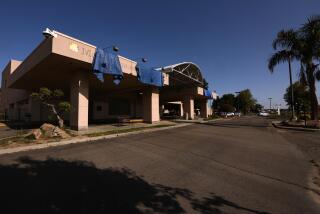Patients Increase Despite Pall of Probes
- Share via
Despite all of the bad publicity, Tenet Healthcare Corp. has been attracting increasing numbers of patients to its hospitals in California.
New state figures show that Tenet’s 40 hospitals in the state enjoyed a 2% average increase in total patient volume in the first quarter from a year earlier.
Some analysts had expected a drop-off in the patient count in the quarter. It was the first full quarter since federal and state investigations into Medicare billing and other practices -- including charges about unnecessary heart procedures at a Tenet hospital in Redding that were settled Wednesday -- had cast a cloud over the Santa Barbara company.
But the rise in patient volume at the chain’s California hospitals was actually larger than the state and national averages, according to analysts.
“They are bucking the trend,” said Andreas J. Dirnagl with Harris Nesbitt Gerard, a securities firm in New York. “It may be their saving grace at the moment.”
The nation’s second-largest hospital chain and the biggest in California, Tenet attributed the year-over-year increase to past investments in its hospitals, many of which have developed specialty departments catering to the aging baby boomer population.
“We believe it is a reflection of the investments we’ve made in services and programs in these communities,” said Gary Hopkins, a spokesman at Tenet.
There may be another factor: Relatively few patients know the name of a hospital’s corporate parent.
Unlike many consumer goods and services, whose sales can rise or fall with a company’s image, hospitals generally are seen as community institutions apart from their owners. Patients usually make decisions based on the reputations of their doctors and their local hospitals, not the standing of some vague corporate parent. And like other big hospital chains, Tenet hasn’t branded its facilities; the corporate name is usually printed below the name of its hospitals and in smaller letters.
“People who don’t read the newspaper might not know this is a Tenet hospital, and they might not care anyway if that’s where their doctor is,” said Sheryl Skolnick, a health-care analyst at Fulcrum Global Partners, an investment firm. “There’s a thinking in the industry that all health care is local.”
Take Jack Kaen, an 88-year-old patient at Tenet’s Midway Hospital and Medical Center in Los Angeles. When asked recently whether he knew the hospital’s owner, he said, “I’m Secure Horizons,” referring to his insurance carrier.
Kaen said he patronized Midway because he lived just a few miles away and had a good experience with his surgery there. He has never heard of Tenet.
Analysts say it’s not clear whether patients such as Kaen would switch to another facility if they knew Tenet owned their hospital. Consumer groups point out that big chains have virtual monopolies in certain areas, giving people little choice in hospitals. Indeed, building market power has been a big part of the strategy at Tenet and some other big U.S. hospital chains.
At Tenet’s Redding Medical Center, patient volume fell in the first quarter, but not as significantly as some may have expected given the intense publicity about allegations that doctors at the hospital performed unnecessary surgeries. In the quarter, the hospital’s patient count, which is measured by discharges, totaled 1,972, down 15% from a year earlier, according to the Office of Statewide Health Planning and Development.
The OSHPD data show that the number of discharged patients at all 423 hospitals in California was flat in the first quarter from a year earlier. These data are unaudited, and some analysts were cautious about reading too much into these self-reported figures. Still, they said the numbers were a good sign for Tenet, which can ill afford to lose patients.
“These numbers are a positive,” said Frank Morgan, health-care analyst with Jefferies & Co. in New York. “It’s one of the key factors we look at when giving our outlook on the company.”
The same OSHPD reports, however, show that despite Tenet hospitals’ generally strong patient volumes, almost all of them had big earnings declines in the first quarter. Tenet had reported a $20-million loss in the first quarter, contrasted with a year-earlier profit of $278 million, largely because the company stopped billing Medicare for special payments for treating the sickest patients. The company is scheduled to report its second-quarter results today.
The OSHPD reports for the first time disclose just how much some individual hospitals have been hurt by the loss of these special Medicare funds, which are payments beyond fixed reimbursements that are made to hospitals for treating the sickest patients. Medicare officials have accused Tenet of collecting hundreds of millions of dollars of excessive payments.
One of Tenet’s most profitable hospitals, Doctors Medical Center in Modesto, posted a nearly 80% decline in pretax net income during the first quarter, to $10.5 million from $47.9 million a year earlier.
Garfield Medical Center in Monterey Park reported $14.7 million in pretax net income in the first quarter of 2002. In the same quarter this year, that fell to $1.6 million.
The hospital that saw the biggest falloff was Redding Medical Center, which showed a loss of $6.6 million, contrasted with a profit of $21.4 million in the first quarter of 2002.
For all of Tenet’s California hospitals, pretax net income in the first quarter fell to $75.6 million from $261.2 million a year earlier, according to the OSHPD reports. By comparison, income at hospitals statewide was up about 13%, to $709 million from $626 million.
More to Read
Inside the business of entertainment
The Wide Shot brings you news, analysis and insights on everything from streaming wars to production — and what it all means for the future.
You may occasionally receive promotional content from the Los Angeles Times.










